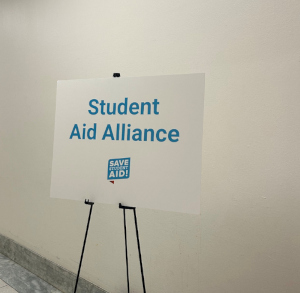
By Yuval Cohen
The Student Aid Alliance, a coalition of more than 40 higher education organizations, recently hosted a briefing on Capitol Hill to highlight the urgent need to protect and strengthen federal student aid programs at a time when their future is increasingly uncertain. (AAU is on the alliance’s steering committee and helped co-sponsor and organize the event, which drew more than 175 congressional staffers.)
Federal student aid programs are currently facing significant threats on multiple fronts. The FY26 appropriations process has already put Pell Grants, Federal Work-Study, and other programs at risk of cuts or flat funding.
Earlier this year, the White House proposed eliminating several vital student aid programs. The House responded to the president’s proposal with a bill that cuts the Federal Work-Study program by $451 million and eliminates Federal Supplemental Educational Opportunity Grants (SEOG), which support students with pressing financial need. The House maintained funding for TRIO and GEAR UP programs and preserved the maximum annual Pell Grant award of $7,395 (the president wanted to lower it to $5,710).
The recently enacted reconciliation bill (H.R. 1) also includes several new restrictions that will narrow students’ access to federal aid and higher education. The legislation caps lifetime borrowing for graduate and professional students, eliminates Grad PLUS loans, and places new limits on Parent PLUS loans, all of which will make it more difficult for students to pursue advanced degrees.
During the Student Aid Alliance briefing, attendees heard from a panel of experts about the crucial role federal aid programs play in helping students gain access to and afford a college education. The panel was moderated by Inside Higher Ed News Editor Katherine Knott and featured speakers from a variety of higher education institutions and associations.

Blue Ridge Community College Assistant Director of Financial Aid Karan Deengar spoke about how proposed cuts to the Federal Work-Study program would increase the waitlist for students waiting on work-study opportunities, impair students’ ability to afford living expenses, and take away valuable work experiences in a variety of fields. (The program provides institutions of higher education with funding to employ undergraduate and graduate students on a part time basis.)
Johns Hopkins University Postdoctoral Fellow Nahin Ferdousi-Rokib shared her own story as a first-generation student and immigrant, noting that federal financial aid made college possible for her at a time when she believed it was out of reach. Her journey inspired her siblings and cousins to pursue higher education as well.
Ferdousi-Rokib spoke about the Graduate Assistance in Areas of National Need (GAANN) program, which allowed her to focus on her doctoral studies at the University of Maryland: “With GAANN, I knew I would be able to eat and cover rent, which allowed me to put more effort into my studies.”
She added that GAANN is particularly powerful because it “keeps brilliance enrolled in PhD programs regardless of financial background.” Ferdousi-Rokib noted that the opportunities she was given would not be possible for future students if these programs are cut. (The president’s budget calls for a reduction to GAANN.)
Panelists also highlighted the declining purchasing power of the Pell Grant, which, in the 1970s, covered more than three-quarters of the average cost of attending a four-year public university, but now covers less than one-third. They stressed the urgent need to increase investments in Pell and other federal programs to ensure that college remains accessible to low- and middle-income students.
The Student Aid Alliance concluded the event by urging lawmakers to provide funding increases for federal student aid programs instead of cutting them. (The alliance sent a letter to lawmakers earlier this year containing its recommendations for the FY26 budget.)
As the speakers noted, disinvestment would not only threaten students’ educational opportunities but also undermine the nation’s workforce needs.
Yuval Cohen is government relations and public policy assistant at AAU.